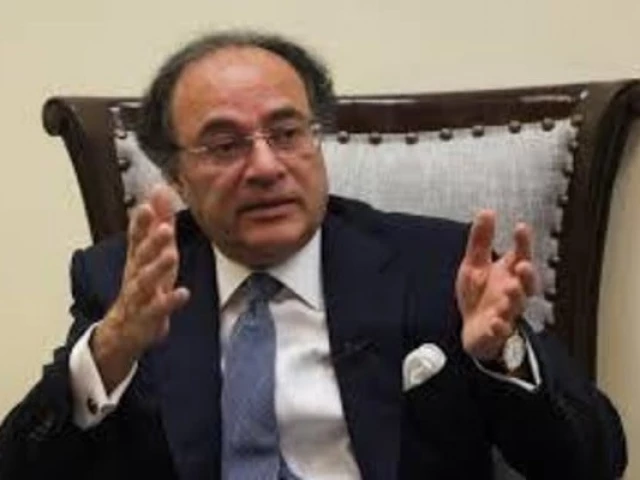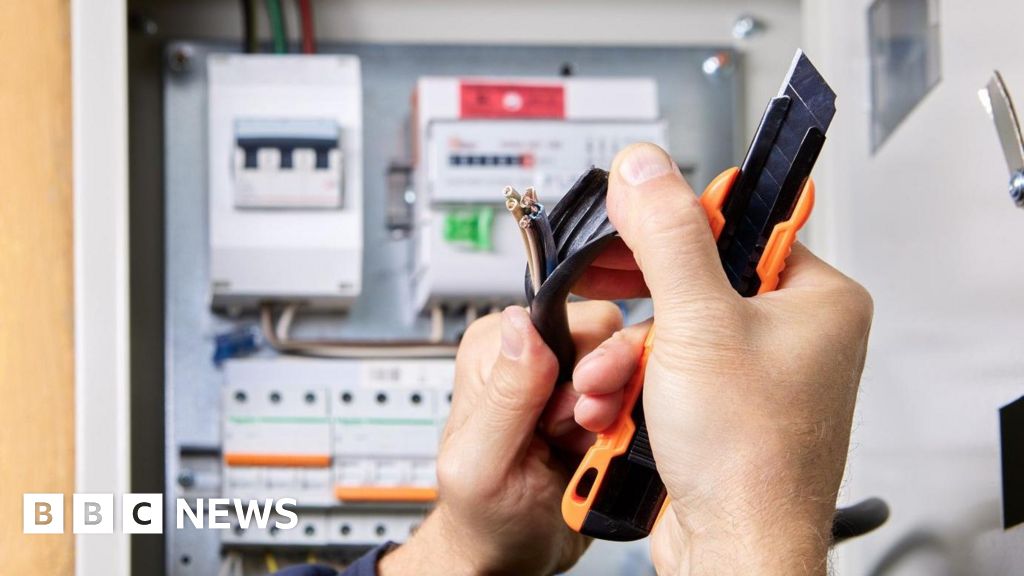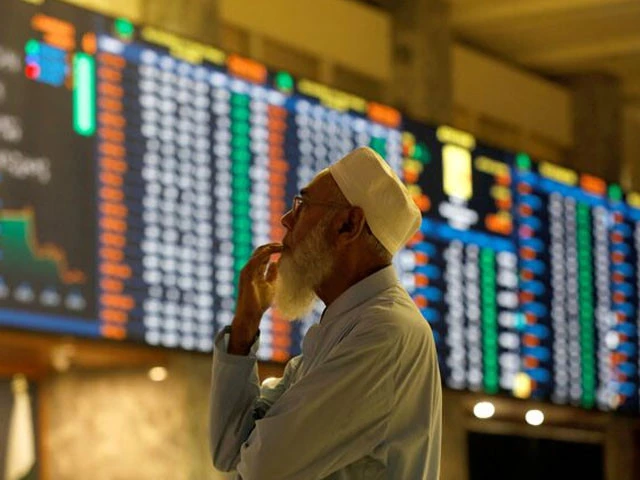Business
FinMin pitches Pakistan’s green growth vision at World Bank forum | The Express Tribune

Aurangzeb outlines agri-finance reforms, climate resilience to drive private sector growth, exports
In Washington, during the sidelines of the IMF World Bank Annual Meetings, Finance Minister Muhammad Aurangzeb addressed a high-level World Bank panel titled “AgriConnect: Farms, Firms, and Finance for Jobs,” spotlighting Pakistan’s push to modernize its agricultural sector while confronting climate risks.
Aurangzeb began by underscoring agriculture’s central role in Pakistan’s economy, contributing nearly one quarter of GDP and supporting millions of smallholder farmers owning less than five hectares. He stressed that policy would shift from direct control to facilitation, allowing the private sector to drive growth in areas where it can be more effective.
He detailed pilot programs now underway, supplying seeds and fertilisers, offering agronomic services, and employing satellite-based crop monitoring to help farmers boost yields while reducing reliance on intermediaries.
To scale these efforts, the minister called on the financial sector to step in, offering first-loss guarantees, subsidized loans, and uncollateralized credit for small and tenant farmers.
Read: Govt close to sealing IMF staff deal, $1.2b payout expected to ease financial pressure
On climate resilience, Aurangzeb emphasised the urgency of adapting to extreme weather events, such as the recent floods that badly affected the rice crop. He noted that one-third of Pakistan’s ten-year Country Partnership Framework with the World Bank is devoted to climate action and decarbonization. Financial resources exist, he said, but deployment must accelerate to meet evolving challenges.
Investing in capacity building, the government has sent around 1,000 Pakistani students to China for advanced training in agricultural research, mechanization, and modern farming methods. In responses to queries, Aurangzeb reaffirmed commitment to deregulation and incentivizing private investment in infrastructure such as cold chains, warehousing, and value-added processing.
Read More: Aurangzeb lands in Washington
He also flagged the export potential of key crops, projecting rice exports of about $3.5 billion in the current year. In his closing remarks, the minister expanded the definition of agriculture’s impact, stating that when the full value chain is included, the sector contributes nearly 40 per cent of GDP.
Earlier in Washington, Aurangzeb also attended the G-24 Ministers’ meeting, where he highlighted Pakistan’s macroeconomic stability, crediting structural reforms in taxation, energy, and privatisation, while thanking the IMF and World Bank for backing tariff reforms and cross-border trade initiatives.
Business
PMI watch: India’s services growth eases in February as demand softens, costs rise – The Times of India

India’s services sector growth eased marginally in February as new business expansion slowed to a 13-month low, reflecting softer demand conditions and a rise in inflation, according to a monthly survey released on Wednesday. The seasonally adjusted HSBC India Services PMI Business Activity Index edged down to 58.1 in February from 58.5 in January. In PMI terminology, readings above 50 denote expansion, while those below 50 indicate contraction. “India’s Services PMI registered 58.1 in February, largely unchanged from January’s 58.5, signalling another month of robust expansion in the sector.” “While new order growth slowed to a 13-month low amid rising competition, service providers saw a notable pick-up in international sales and responded with increased hiring to meet operational needs,” said Pranjul Bhandari, Chief India Economist at HSBC. According to respondents, some firms benefited from stronger client enquiries and targeted marketing efforts, which supported sales. However, others reported that an increasingly competitive landscape limited the pace of growth. External demand stood out during the month. Services companies recorded improved business from several overseas markets, including Canada, Germany, mainland China, Singapore, the UAE, the UK and the US. Overall, international sales rose at the quickest pace since last August. Cost pressures intensified for service providers in February. Operating expenses increased at the sharpest rate in two-and-a-half years, prompting firms to raise their selling prices at the fastest pace in six months. “Input and output price inflation accelerated, with firms passing higher expenses — particularly for food and labour — on to customers, yet business confidence climbed to its highest level in a year as companies looked to broaden their market presence,” Bhandari said. At the combined level, private sector activity strengthened further. Total business output across manufacturing and services expanded at the fastest rate in three months, supported by improved demand and higher new business inflows. The HSBC India Composite PMI Output Index climbed to 58.9 in February from 58.4 in January. “Overall, the composite PMI rose to 58.9, reflecting the fastest pace of private sector activity growth in three months, buoyed by strong momentum in manufacturing,” Bhandari said. Composite PMI figures represent weighted averages of manufacturing and services indicators, with the weights reflecting their respective shares in official GDP data. While the pace of new order growth at the composite level was broadly similar to that seen around the start of the year, hiring activity strengthened to its highest level since last October. Inflationary trends were also evident in the broader private sector, with both input costs and output charges rising at quicker rates. These increases reached nine-month and six-month highs, respectively.
Business
80% Stocks Already In Bear Market; Should You Buy The Dip Or Run For Safety?

Last Updated:
India’s Sensex and Nifty correct 6-7%, with 80% of stocks in bear territory. Monarch AIF reports 64% of stocks over Rs 1,000 crore market cap has fallen 30%.


Hundreds of midcap and smallcap companies have quietly lost significant value.
India’s benchmark indices may not show it, but a large part of the market is already in deep correction. According to a report by Monarch AIF, while the Sensex and Nifty have corrected only about 6-7 per cent from their record highs, nearly 80 per cent of listed stocks are already in bear market territory.
The data highlights a sharp divergence between headline indices and the broader market.
Majority of Stocks Deep In Correction
The report analysed companies with a market capitalisation above Rs 1,000 crore.
It found that over 64 per cent of these stocks have fallen more than 30 per cent from their all-time highs. Nearly 78 per cent have declined over 20 per cent.
In simple terms, most stocks in the market have already seen a brutal correction even though benchmark indices remain relatively elevated.
This unusual divergence has been playing out for the past 18 months.
Why Indices Are Still Holding Up
According to the report, Indian markets are witnessing a rare phase of simultaneous time and value correction.
A narrow set of large-cap stocks has kept the benchmark indices elevated. Meanwhile, hundreds of midcap and smallcap companies have quietly lost significant value.
This has created a misleading picture where the indices appear stable but the broader market has been under sustained pressure.
Now A New Shock: Middle East War
The situation has become more complicated after the recent escalation in West Asia.
Following US-Israel strikes on Iran, global markets have turned volatile and crude oil prices have surged.
Amid these developments, the Sensex recently fell over 1,000 points, while the Nifty slipped below the 24,900 level.
For investors, the challenge is that a market already weakened by months of selling is now facing geopolitical risks and a potential oil shock.
Should Investors Buy Or Wait?
Aakash Shah, Technical Research Analyst at Choice Equity Broking, advised caution. “Amid persistent global uncertainties and elevated volatility, market participants are advised to maintain discipline and adopt a selective approach, focusing on fundamentally strong stocks during corrective phases. Fresh long positions should ideally be considered only after a decisive and sustained breakout above the 25,000 mark on the Nifty, which would signal improving sentiment and confirm the development of a stronger bullish structure,” he said.
Key Risk For India: Rising Oil
V K Vijayakumar, chief investment strategist at Geojit Investments, said the biggest concern for India is rising crude prices.
“With the war escalating and crude rising, markets are going into a period of heightened uncertainty. Nobody knows how long this conflict will go on and what will be the extent of the havoc it could wreck. From the perspective of India, which relies on imports for around 85% of her oil requirements, the real concern is the potential inflation and its consequences on economic growth. From the market perspective, the impact of potentially widening trade deficit, depreciating currency, higher inflation and perhaps lower growth is the real issue. If this fear materialises, corporate earnings will be impacted,” he said.
However, he added that the impact may be temporary if the conflict ends quickly.
“If it ends in, say 3 to 4 weeks, things will be back to normal,” he said.
Don’t Panic, Use Corrections
Despite the volatility, Vijayakumar advised investors not to panic. “Experience tells us that panicking and getting out of the market during uncertain times like these is not the right thing to do. Markets have an uncanny ability to surprise and climb all walls of worries,” he said.
According to him, investors with a long investment horizon and higher risk appetite can gradually accumulate quality stocks during corrections.
He added that sectors such as banking, pharmaceuticals, automobiles and defence may offer attractive long-term opportunities.
Follow News18 on Google. Join the fun, play games on News18. Stay updated with all the latest business news, including market trends, stock updates, tax, IPO, banking finance, real estate, savings and investments. To Get in-depth analysis, expert opinions, and real-time updates. Also Download the News18 App to stay updated.
March 04, 2026, 13:39 IST
Read More
Business
‘I fiddled the meter for a mate – and the shop burnt down’

A BBC investigation speaks to electricians and families setting up illegal meter bypasses to steal power.
Source link
-

 Business1 week ago
Business1 week agoHouseholds set for lower energy bills amid price cap shake-up
-

 Politics6 days ago
Politics6 days agoWhat are Iran’s ballistic missile capabilities?
-

 Business5 days ago
Business5 days agoIndia Us Trade Deal: Fresh look at India-US trade deal? May be ‘rebalanced’ if circumstances change, says Piyush Goyal – The Times of India
-

 Politics6 days ago
Politics6 days agoUS arrests ex-Air Force pilot for ‘training’ Chinese military
-

 Fashion6 days ago
Fashion6 days agoPolicy easing drives Argentina’s garment import surge in 2025
-

 Sports1 week ago
Sports1 week agoTop 50 USMNT players of 2026, ranked by club form: USMNT Player Performance Index returns
-

 Business6 days ago
Business6 days agoAttock Cement’s acquisition approved | The Express Tribune
-

 Business1 week ago
Business1 week agoLucid widely misses earnings expectations, forecasts continued EV growth in 2026













